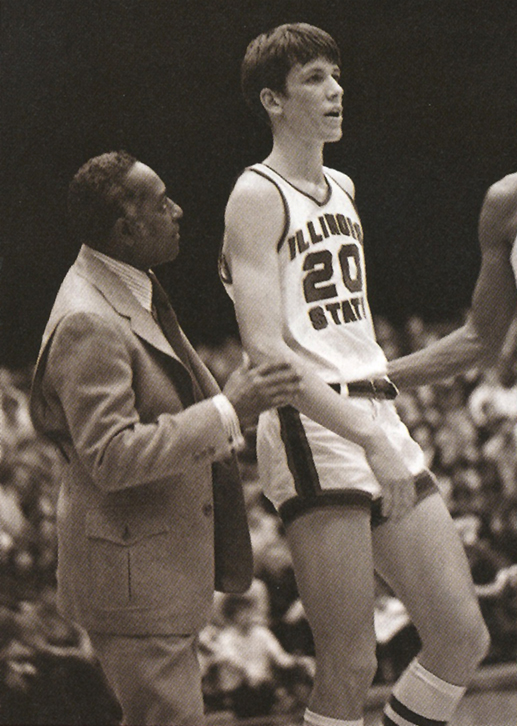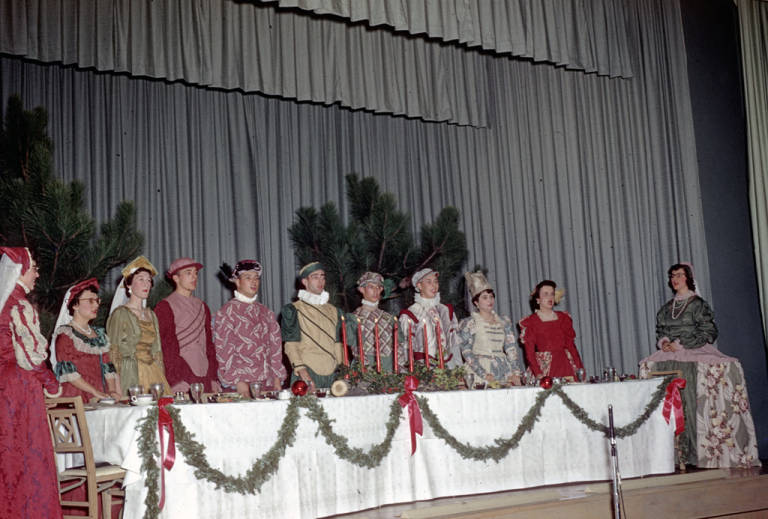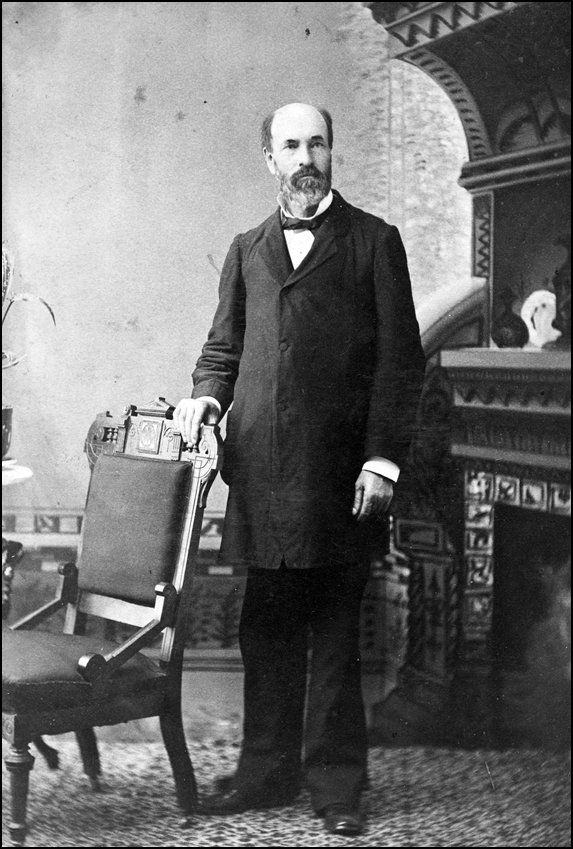From legendary men’s basketball coach Will Robinson’s first Redbird game to the University’s first Madrigal Dinner, historian Tom Emery explores this month in Illinois State University history.
December 1
On this date in 1970, the Illinois State University men’s basketball team played its first game under Will Robinson, the first African American head coach in NCAA Division I history.
Robinson’s five years at Illinois State were part of an illustrious career in multiple sports. He came to Normal after a sparkling 28-year head coaching career on the high school level in the Detroit area, including at Miller High School and Pershing High School.
A ground-breaker throughout his life, Robinson was the first African American high school coach in Michigan history. He remained the lone Black high school coach in Michigan for 16 years. His 1967 Pershing team included five players who went on to NBA or NFL careers.
On February 27, 1970, Robinson was hired as the Redbirds’ head coach, and made his on-court debut at Horton Field House in the season opener that December 1. As the Vidette reported, the Redbirds, “ignoring opening night shakes…calmed down to a contest of attrition” in an 80-67 victory over Bemidji State.
That same night, Doug Collins made his varsity debut for Illinois State and finished with 15 points. Collins and Robinson would become synonymous with the Redbirds’ success of the early 1970s, and Collins would leave as the school’s all-time leading scorer. He was a member of the 1972 U.S. Olympic team and the top pick in the 1973 NBA draft.
Robinson’s Illinois State teams finished with winning records in each of his five seasons at the helm, and featured some of the most potent offenses in school history. The Redbirds broke the 100-point mark in 26 games under Robinson, including four-straight from February 12-22, 1975.
After leaving Illinois State in 1975, Robinson returned to Detroit and became a scout for the Detroit Pistons, helping discover some of the franchise’s all-time great players. Prior to that, Robinson scouted for the Detroit Lions and found some of that team’s best-ever performers.
During the Pistons’ NBA title season of 2003-04, the franchise named its locker room the “Will Robinson Locker Room of Champions.” Robinson died in Detroit at age 96 on April 28, 2008, ending the life of a sports hero whose legacy touched countless lives, including in Normal.
December 16
On this date in 1956, the first Madrigal Dinner was held on the Illinois State campus. The event began a tradition that lasted for six decades and rose to become one of the University’s most beloved campus activities.
The Madrigal Singers at Illinois State had been founded in the fall of 1956, and their holiday dinner quickly took hold.
Tickets for that first event, held in the Student Union, cost $2.50 and featured the breathtaking, a capella music of madrigals, which came to England from Italy in the 16th century. The initial dinner also featured a blend of American and European folk songs, modern compositions, choral works, and seasonal selections.
The feast portion of the events included traditional English fare. The menu for the 1984 dinner included such delicacies as wassail, beef barley soup, roast prime rib, “madrigal bread,” peaches jubilee, oven-roasted potatoes, and glazed carrots. Traditional English humor highlighted the events, and always brought laughter.
By the 1970s, the Madrigal Dinners had exploded in popularity. The 1971 event featured 17 dinners, with an average attendance of 325 for each performance.
However, the tradition finally began to wane in 2008, when attendance began to decline amid increased competition not only for consumer dollars, but also in the high number of holiday activities in the area. Production costs also rose, including maintenance of the ornate and beautiful costumes, some of which were 40 years old.
The final Madrigal Dinners on December 11-13, 2015, were a bittersweet ending to a longtime favorite of the Illinois State community—one that generated countless smiles and memories.
December 23
On this date in 1822, Richard Edwards, the second President in Illinois State University history, was born. Always at the forefront of racial progression, Edwards remains among the titans of 19th-century education in Illinois.
Born on December 23, 1822 in Wales, Edwards emigrated to America with his family in 1833, eventually landing in Ohio. There, he attended a school taught by a farmer.
Choosing to further his education, he left for Massachusetts in October 1844 before enrolling in July 1845 at what is today Bridgewater State in Massachusetts. He graduated in 1847 and became part of a long line of educational leaders that hailed from Bridgewater State, teaching there from 1848-53.
Edwards spent the 1853-54 academic year as head of a boys’ high school in Salem, Massachusetts, before being named principal of the new State Normal School in Salem. That institution had been founded in 1854 by the renowned Horace Mann and is today Salem State University. Edwards remained for three years, then was a headmaster at various schools in St. Louis.
In 1862, he became the second president of Illinois State University, arriving with a sterling reputation. One Illinois State historian assessed Edwards as “arguably the foremost American schoolmaster in the 1860s and 1870s.” In 1863, Harvard awarded an honorary master’s degree to Edwards.
Edwards stressed the need for professional credentials for teachers and implemented a university practice of involvement in off-campus workshops for both faculty and the university president. Some credit Edwards with coining the phrase “the grandest of enterprises” to describe the teaching profession.
Never afraid to take a strong stand, Edwards was a champion of racial equality, particularly in educational opportunity. His views earned the wrath of both opponents and an often-hostile press, but he inspired many university graduates to push for racial equality in their own educational careers.
In 1873, Edwards was ordained, and frequently preached at various local churches in Normal. He resigned from Illinois State in 1876, later serving as a congregational pastor in Princeton (1876-84), financial agent for Knox College (1884-86), Illinois Superintendent of Public Instruction (1886-1890), and president of Blackburn College (1891-93).
Edwards retired to Bloomington before his death on March 7, 1908. He is buried in Evergreen Cemetery.
Today on the Illinois State campus, the Mennonite College of Nursing is housed in Edwards Hall, a memorial to one of the nation’s foremost educators of the 19th century.
December 30
On this date in 1956, Suzy Bogguss ’80, a mainstay on country radio throughout the late 1980s and early 1990s, was born.
Bogguss charted six top-10 hits in her career, including “Drive South,” which reached No. 2 on the Billboard Hot Country charts on March 6, 1993. Three of her albums were certified gold, while another was certified platinum.
In 1989, Bogguss was named Top New Female Vocalist by the Academy of Country Music. That same year, she earned a Grammy nomination for a duet with Lee Greenwood, “Hopelessly Yours.” Bogguss received the Horizon Award, given annually from the Country Music Association to the most promising new artist of the year, in 1992.
A versatile performer, Bogguss created albums in both 2003 and 2007 that landed in the top-10 of the jazz charts. In addition, she has continued her folk roots throughout her career, and won a Grammy in 2005 for Best Traditional Folk Album. Bogguss released her 17th studio album, including folk, country, and jazz, last month (November 2023).
A native of Aledo, Bogguss was the daughter of a former Army officer who served in the Pacific theater in World War II. Like many entertainers, she began singing in her church choir as a child.
Bogguss, who remains an active performer, majored in metalsmithing at Illinois State, which she used to create her own jewelry.
Tom Emery is a freelance writer and historical researcher who, in collaboration with Carl Kasten ’66, co-authored the 2020 book Abraham Lincoln and the Heritage of Illinois State University.
Source link

Felecia Phillips Ollie DD (h.c.) is the inspiring leader and founder of The Equality Network LLC (TEN). With a background in coaching, travel, and a career in news, Felecia brings a unique perspective to promoting diversity and inclusion. Holding a Bachelor’s Degree in English/Communications, she is passionate about creating a more inclusive future. From graduating from Mississippi Valley State University to leading initiatives like the Washington State Department of Ecology’s Equal Employment Opportunity Program, Felecia is dedicated to making a positive impact. Join her journey on our blog as she shares insights and leads the charge for equity through The Equality Network.







